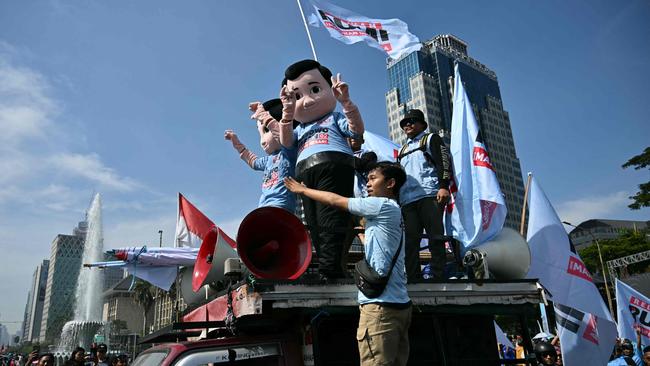
Ahead of his inauguration, the country’s most respected polling house, Indikator, found the former special forces chief had the confidence of almost 84 per cent of his nation’s 280 million people.
Whether or not you believe a very-Indonesian “Insha’allah” (“God willing”) response to probing survey questions is a true representation of sentiment, few could dispute the country’s eighth president has a thumping mandate to deliver on his promise to eradicate poverty and secure high income status for Southeast Asia’s largest economy.
Now to the job at hand.
That Prabowo, having strived for decades to reach the presidential palace, is determined to leave a strong and positive legacy is irrefutable. How he seeks to fulfil his core election pledges is another question.
Long-held fears that a Prabowo presidency would mark a return to autocracy now seem overblown and outdated, in part because he inherits from his predecessor and political backer Joko Widodo, extraordinary presidential powers and compromised democratic institutions.
What need is there to overturn a democracy that has already been white-anted from within?
Prabowo is a shrewd politician and a nationalist who understands any serious attempt to unwind Indonesia’s democracy would upset the careful balance it seeks to maintain between great powers.
Indonesia’s new president, like the outgoing Jokowi, may look just as firmly to China to drive growth, but he is well aware of how over-reliance on Beijing has painted some neighbouring countries into sovereignty-eroding corners.
Indonesia is also learning painful lessons from its heavy lean on Chinese investment in the nickel sector, which has all but locked it out of US and European markets.
He will want to counter Beijing’s presence with a more balanced portfolio of western investment interests. He made that clear to Anthony Albanese during his August visit to Australia, when the Prime Minister made a promise he was ultimately unable to honour – that he would be in Jakarta for the inauguration.
Deputy Prime Minister Richard Marles came in his place, cutting a lonely figure as he entered the national parliament behind a roster of state leaders from neighbouring countries, including Singapore, South Korea, The Philippines, Cambodia, Malaysia, East Timor and Solomon Islands.
Australian envoys understood well that Jokowi measured diplomatic ties in hard currency – did the bilateral relationship deliver trade and investment growth?
Under Prabowo, it will be a more complicated and unpredictable equation.
As one regional analyst recently observed: “A deeper unknown is whether Prabowo will act on his darker tendencies to see the world as a Hobbesian contest, where national power must derive from military power, leading to a tendency to overstate perceived threats to Indonesia or intensify negative rhetoric vis-a-vis its neighbours”.
Prabowo’s inclination as a former military man is to look to the security forces when he needs a job done. He did so as defence minister when he was given the task of expanding the nation’s food estates, and is expected to do the same as he rolls out his free lunch program.
Twenty-six years ago it took a people’s revolution to send the Indonesian military back to its barracks. What role this powerful institution gets to play in the next administration will be one to watch.




At 73 years of age, Prabowo Subianto may not quite fit the mould of a comeback kid, but there is no doubt Indonesia’s third-time lucky new president enters office with a strong wind at his back.